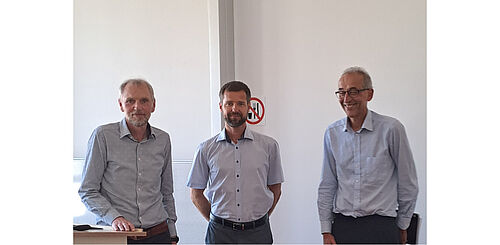Am 14. Juni 2023 hat Ron Henkel, externer Doktorand am Lehrstuhl Wirtschaftsinformatik, erfolgreich seine Doktorarbeit verteidigt. Das Thema der Arbeit war „Contributions to the Reuse and Reproducibility of Computational Biology Models”. Gutachter waren Prof. Kurt Sandkuhl und Prof. Jacky Snoep (Stellenbosch University, Südafrika). Das Ergebnis der Verteidigung war die Empfehlung an die Universität, den Doktorgrad „Dr.-Ing.“ zu verleihen, da die Arbeit als sehr gut eingeschätzt wurde. Das Foto zeigt (v.l.) Prof. Kurt Sandkuhl, Dr. Ron Henkel und Prof. Jacky Snoep.
Abstract:
The ability to reproduce research is at the heart of science. Results can only be scientifically relevant if it can be reproduced, providing that experimental settings are coherently reported. This also holds true for computational research, such as models developed to gain deeper insights into biological systems as it is done in the life sciences and systems biology in particular. With the rapidly increasing number of available models and new ones being developed, crucial tasks for any researcher in this field are to find models of relevance, to keep track of changes in a model of interest, and to ultimately run the model in order to reproduce scientific findings from in a publication. However, with the current storage and organisation of models, those tasks are in the best case tedious, thus rendering model reuse and reproducibility of modeling results nearly impossible.
This thesis contributes to improving reuse and reproducibility of computational biology models by suggesting and implementing innovative and efficient means for model storage, model retrieval and comparison, and model provenance. The model management concepts developed and implemented here, provide a graph-based model storage and a sophisticated model retrieval framework, two crucial steps towards a FAIR model management. In addition, as the storage and retrieval concept also include model meta-information from a variety of domains, the thereby created knowledge graph is able to provide results for domain-spanning queries. Having such a knowledge graph at hand offers a variety of new research possibilities, e.g., for model analysis and data exploration.
With a scientifically broader view and looking into the future, expanding and integrating concepts and implementations developed in context of this thesis towards medical sciences seems to be the next logical step. Such a transition will allow to connect different domains such as systems biology, systems medicine and medical informatics and might serve as a way to bridge the gaps between those scientific disciplines.

